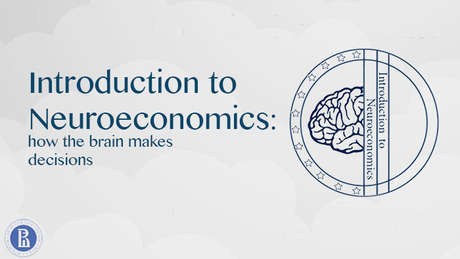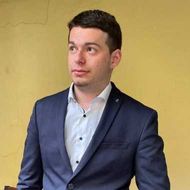- A
- A
- A
- АБB
- АБB
- АБB
- А
- А
- А
- А
- А
- Национальный исследовательский университет «Высшая школа экономики»
- Учебные подразделения
- Факультет социальных наук
- Департамент психологии
- Новости
- Декан факультета психологии ВШЭ Василий Ключарев прочитает на образовательном проекте «Coursera» курс "Introduction to Neuroeconomics: how the brain makes decisions"
-
Подразделения
- Кафедры
-
Центры и лаборатории
-
- Центр фундаментальной и консультативной персонологии
- Научно-учебная лаборатория психологии социального неравенства
- Научно-учебная лаборатория политико-психологических исследований
- Научно-учебная лаборатория психологии салютогенной среды
- Научно-учебная лаборатория когнитивных исследований
- Научно-учебная лаборатория когнитивной психологии пользователя цифровых интерфейсов
- Научно-учебная группа «Психология организационной коммуникации»
- Лаборатория языковых, межкультурных и творческих компетенций
-
Партнерские центры и лаборатории
-
- Партнеры
-
Образование
- Бакалавриат
- Магистратура
- Аспирантура
- Школьникам
- Дополнительное образование
-
Департамент
Тел.: 8 (495) 772-95-90 *15366
E-mail: dekpsy@hse.ru
Фактический адрес: 101000, г. Москва, Армянский пер. 4, корп. 2
Почтовый адрес: 101000, г. Москва, ул. Мясницкая, д. 20 (департамент психологии)
Психология – одна из наиболее бурно развивающихся в настоящее время наук о человеке, включающая, с одной стороны, такие фундаментальные исследовательские направления, как общая психология и психология личности, социальная и кросскультурная психология, когнитивная психология и психофизиология, экономическая психология и психология принятия решения, а с другой – такие практико-ориентированные направления, как психологическая диагностика, индивидуальное и семейное психологическое консультирование, психоанализ, организационная психология. Все эти направления развиваются в департаменте ведущими российскими психологами, для которых выбор психологии стал выбором не только профессии, но и судьбы.
В печати
Мирошниченко Е. Д., Витовская Д. И., Марарица Л. В.
Экспериментальная психология. 2026. Т. 19. № 3.
В кн.: Психология XXI века — 2025: человек и мир. Сборник тезисов участников XXIX Международной научно-практической конференции студентов, аспирантов и молодых ученых 16–18 апреля 2025 г.. СПб.: Скифия-принт, 2025. С. 115-117.
Ivanova M., Germanova K., Petelin D. et al.
Biorxiv. 005140. Cold Spring Harbor Laboratory, 2024

Декан факультета психологии ВШЭ Василий Ключарев прочитает на образовательном проекте «Coursera» курс "Introduction to Neuroeconomics: how the brain makes decisions"
 About the Course
About the Course
Economics, psychology, and neuroscience are converging today into a unified discipline of Neuroeconomics with the ultimate aim of providing a single, general theory of human behaviour.
Neuroeconomics can provide economists and social scientists with a deeper understanding of how they make their own decisions, and how others decide. Are we hard-wired to be risk-adverse or risk-takers? How is a “fair decision” evaluated by the brain? Is it possible today to predict the purchasing intentions of a consumer? Can we modulate economic behaviour affecting the brain?
Neuroscience allied to psychology and economics have powerful models and evidence to explain why we make a decision… and whether it is rational or not. Decision-making in financial markets, trust and cooperation in teams, consumer persuasion, will be central issues in this course in neuroeconomics. You will be provided with the most recent evidence from brain-imaging techniques (PET, fMRI and TMS), and you will be introduced to the explanatory models behind them.
The course will start by discussing the foundations of neuroeconomics and the neuroanatomy of the brain (Module I: “How the brain works”).
Module II (“How the brain decides”) then focuses on the core building block of neuroeconomics: decision theory. In a simple way, you will be presented with the main theories accounting for how individuals decide, supported by key empirical studies.
The next module will study the balance between rationality and emotions (Module III: “How the brain feels”): how our emotions interfere with our so-called rational judgments.
Module IV (“Society of brains”) focuses on society: how groups and the social environment interact with individual decision-making. This module will have strong implications for marketing, public policy and public education.
Language: English
Lecturer: Vasily Klucharev
 Dr. Vasily Klucharev received his Ph.D. in physiology from the St. Petersburg State University in 2000. Klucharev is a leading expert in neuroeconomics mechanisms of social behaviour and social influence on human decision making. He has published widely in prestigious neuroscience journals such as Neuron, Journal of Neuroscience, SCAN, and many others. Klucharev had been involved as a researcher at the Laboratory of Computational Engineering, Helsinki University of Technology (2000-2004), Erasmus Research Institute Management (Rotterdam) and Donders Institute for Brain, Cognition and Behaviour (2004-2009). He has been a senior researcher and lecturer at the University of Basel since 2009 and a professor, dean of the Faculty of Psychology at the Higher School of Economics, Moscow.
Dr. Vasily Klucharev received his Ph.D. in physiology from the St. Petersburg State University in 2000. Klucharev is a leading expert in neuroeconomics mechanisms of social behaviour and social influence on human decision making. He has published widely in prestigious neuroscience journals such as Neuron, Journal of Neuroscience, SCAN, and many others. Klucharev had been involved as a researcher at the Laboratory of Computational Engineering, Helsinki University of Technology (2000-2004), Erasmus Research Institute Management (Rotterdam) and Donders Institute for Brain, Cognition and Behaviour (2004-2009). He has been a senior researcher and lecturer at the University of Basel since 2009 and a professor, dean of the Faculty of Psychology at the Higher School of Economics, Moscow.
Регистрация на курс на Coursera
- О ВЫШКЕ
- Цифры и факты
- Руководство и структура
- Устойчивое развитие в НИУ ВШЭ
- Преподаватели и сотрудники
- Корпуса и общежития
- Закупки
- Обращения граждан в НИУ ВШЭ
- Фонд целевого капитала
- Противодействие коррупции
- Сведения о доходах, расходах, об имуществе и обязательствах имущественного характера
- Сведения об образовательной организации
- Людям с ограниченными возможностями здоровья
- Единая платежная страница
- Работа в Вышке
- ОБРАЗОВАНИЕ
- Лицей
- Довузовская подготовка
- Олимпиады
- Прием в бакалавриат
- Вышка+
- Прием в магистратуру
- Аспирантура
- Дополнительное образование
- Центр развития карьеры
- Бизнес-инкубатор ВШЭ
- Образовательные партнерства
- Обратная связь и взаимодействие с получателями услуг
-
http://www.minobrnauki.gov.ru/
Министерство науки и высшего образования РФ
-
https://edu.gov.ru/
Министерство просвещения РФ
-
http://www.edu.ru
Федеральный портал «Российское образование»
-
https://elearning.hse.ru/mooc
Массовые открытые онлайн-курсы
- © НИУ ВШЭ 1993–2025 Адреса и контакты Условия использования материалов Политика конфиденциальности Карта сайта
- Редактору


